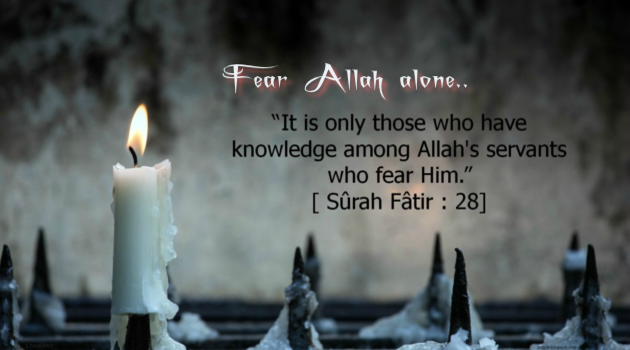From among the stations of worshipping Allah and seeking His help is the station of fear.
Fear is one of the most important stations on the path and most beneficial for the heart. Fear is an obligation upon everyone, Allah said,
“So fear them not, but fear Me, if you are (true) believers.” [Surah ‘Ali ‘Imran, 3:175]
The actual word used for fear in this verse is ‘khawf.’
Another verse says,
“and fear none but Me.” [Surah al-Baqarah, 2:40]
the actual word being a derivative of ‘rahba.’
And,
“Therefore fear not men but fear Me,” [Surah al-Ma’idah, 5:44]
the actual word in Arabic being ‘khashya.’ Different connotations of these various terms in Arabic for fear will be discussed shortly.
Allah has praised those who possess the attribute of fear saying,
“Verily! Those who live in awe for fear of their Lord;“ [Surah al-Mu’minun, 23:57]
Fear (of Allah’s displeasure or punishment) is not only for grave sinners, but also for the pious, observant believers, as in the following hadeeth:
Aisha (ra) said,
“O Messenger of Allah, is the verse “And those who give that (their charity) which they give (and also do other good deeds) with their hearts full of fear (whether their alms and charities, etc., have been accepted or not), because they are sure to return to their Lord (for reckoning).” [Surah al-Mu’minun, 23:60] referring to someone who commits fornication, drinks alcohol and steals and still fear Allah?”
The Prophet, Sallallahu alayhi wassallam, said, “No, O daughter of as-Siddiq, but it refers to one who fasts, perform salah and gives charity, and fears that it may not be accepted from him.” [Tirmithi]
Al-Hasan, commenting on this, said, “By Allah, they (the Companions) obeyed Him and strove hard in it, yet they feared it might be rejected. A believer combines righteousness with fear in his heart, while a hypocrite combines evil with impunity.”
The terms ‘wajal,’ ‘khawf,’ ‘khashya’ and ‘rahba,’ are used in the Quran to refer to what we have translated as ‘fear’, but they are not synonyms.
Abul-Qasim al-Junayd said, “Al-khawf is the anticipation of punishment.”
Another scholar said, “Al-khawf is the moving of the heart upon the cognizance of that which is feared.”
The word khashya is more specific than khawf, for it is specific to the true knowers of Allah – as Allah, subhanahu ta’ala, said,
“It is only those who have knowledge among His slaves that fear Allah.“ [Surah Fatir, 35:28]
Hence, khashya. is fear associated with the intimate knowledge (ma’rifa) of Allah-as the Prophet, Sallallahu alayhi wassallam, said,
“I am most mindful of Allah among you, and most intense in fearing Him.” [Bukhari, Muslim]
Khawf is movement in its essence, while khashya is concentration, stillness, and holding of breath. For example, someone who sees a fierce enemy or a flood or something like that has two states: first, movement in order to flee from it, and this is the state of khawf. Second, his stillness in a place safe from the danger-and this is khashya.
Ar-Rahba means the urge to run away from the danger-which is the opposite of ar-Raghba, which means the urge of the heart to journey towards that which it likes.
Al-Wajal is the trembling of the heart upon the cognition or remembrance of someone whose power or punishment one fears.
Al-Haybah is fear associated with awe and glorification, and its greatest form is that which occurs in association with love and intimate knowledge (ma’rifa).
Al-Khawf, then, is for the common believers, while al-kbashya is for the scholars with profound knowledge, while at-haybah is for those nearest to Allah. The extent of one’s fear for Allah is proportional to one’s knowledge, both formal and experiential, of Allah. As the Prophet, Sallallahu alayhi wassallam, said,
“I am the most knowledgeable of Allah among you, and most intense in His khashya.”
In another narration of the same hadeeth, the word used is khawf instead of khashya. The Prophet, Sallallahu alayhi wassallam, also said,
“If you knew what I know, you would laugh little and weep much, and would not enjoy intimacy with women, and would go out wandering in the wildernesses and praying to Allah.” [Ahmad]
When faced with his object of fear, a man with khawf turns to fleeing and grabbing, while a man with khashya seeks the support of knowledge. For example, when a lay person is faced with an illness, he seeks to protect himself (and seeks someone who could help) while a skilled physician turns to investigating the illness and the cure.
Abu Hafs says, “Al-khawf is Allah’s lash with which He straightens up those fleeing from His door.” He also said, “Al-khawf is a lamp in the heart, with which the good and the evil inside of the heart can be seen-and everyone you fear from, you run away from him, except Allah-when you fear Him, you run towards Him for refuge.”
Hence, the one who fears Allah is a refugee towards His Lord’s [mercy] from his Lord’s [displeasure].
Abu Suleiman said, “Whenever fear (of Allah) departs a heart, it is ruined.”
Ibraheem ibn Sufyan said, “When fear of Allah resides in hearts, it burns away the sources of lust and eradicates worldly attachments.”
Thun-Noon said, “People will stay on the path so long as they have (Allah’s) fear when this fear leaves them, they will go astray.”
Fear, however, is not the end in itself, but a means towards an end. When that end, Allah’s ultimate pleasure, is attained, there is no need for fear. As Allah says to the people of Paradise: “there is no fear upon them, nor do they grieve.”
Fear is associated with actions, while love is connected with being and attributes. When the believers enter the Realm of Allah’s eternal blessings, their love will multiply, while their fear will disappear. Hence, the place of love is higher and nobler than the place of fear.
The true and praiseworthy fear is that which stops a person from the prohibitions of Allah. But when fear exceeds this boundary, it may bring hopelessness and despair.
Abu Uthman said, “Sincerity of fear is vigilance from sins, open and secret.” Shaykhul Islam Ibn Taymiyyah, may Allah honor his soul, said, “The praiseworthy fear is that which prevented you from the prohibitions of Allah.”
The author of al-Manazil, Shaykh al-Harawi, said, “Al-khawf, or fear, is to do away with careless sense of security by envisioning the great news (of the Last Day).”
He further said, “The beginning of fear is the fear of punishment, and this kind of fear is sufficient to establish the soundness of one’s faith. It is born out of one’s affirmation of the warning (of Allah’s punishment), recognition of one’s transgressions and consideration of the punishment.”
Thus, fear is preceded by cognition and knowledge for a man cannot fear what he does not know.
Two more things are related to fear: the thing or occurrence that is feared, and the way that leads one to it. Lack of knowledge of either of these leads to a concomitant lack of fear. If one does not know that a certain act leads to a feared outcome or he knows so but does not know the value or might of that which he claims to fear, one does not really have true fear. Similarly, an active awareness of the punishment or loss that one fears, not just a passive and abstract knowledge of it, is an indication of the sincerity of fear and sound faith.
Another praiseworthy category of fear is to fear returning to the state of sinfulness and heedlessness after one has attained closeness to Allah and sincere fear of His displeasure-for if one feels unduly secure in one’s state, it is likely that one will go back to the state of sinfulness.
Balancing Fear with Hope
The heart in its journey towards Allah, subhanahu ta’ala, is like a bird whose head is love, and hope and fear are its two wings. When the head and the two wings are sound and healthy the flight of the bird is good, but when the head is cut off, it immediately dies, and when either or both wings are deficient, the bird cannot properly fly and may become victim of any hunter or snare. The righteous predecessors preferred to strengthen the wing of fear during good times when heedlessness is feared, and to strengthen the wing of hope at times of calamity and when near death.
Some have said that it is better to strengthen fear more than hope because when vain hopes overcome a person he is ruined. Others say that the best of situations is a complete balance of hope and fear with overwhelming love, for love is composite,while hope is a sharpener and fear a driver.
– By: Imam Ibn ul Qayyim al Jawziyyah
 navedz.com a muslim's Quest for the truth
navedz.com a muslim's Quest for the truth









